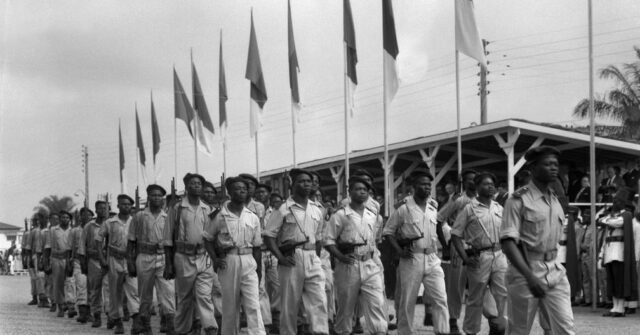AFP — France waged a “war” in Cameroon marked by “repressive violence” during and after the African country’s decolonisation in the late 1950s, President Emmanuel Macron acknowledged in a letter published Tuesday.
The letter, sent to his Cameroonian counterpart last month, is the latest example of France’s efforts under Macron to come to terms with its often-bloody colonial history.
The admission follows an official report, published in January, which said that France implemented mass forced displacement, pushed hundreds of thousands of Cameroonians into internment camps and supported brutal militias to quash the central African country’s push for sovereignty.
The historical commission examined France’s role in the years both leading up to and after Cameroon gained independence from France on January 1, 1960.
“The historians of the commission made it very clear that there was a war in Cameroon, during which the colonial authorities and the French army carried out repressive violence of several kinds… that continued after 1960,” Macron said in the letter to Cameroonian President Paul Biya, published by the French presidency.
“It is incumbent on me today to accept France’s role and responsibility in these events,” he said.
Macron announced the creation of the commission during a 2022 trip to the Cameroonian capital Yaounde.
Composed of both French and Cameroonian historians, the 14-person committee looked into France’s role in the country between 1945 and 1971 based on declassified archives, eyewitness accounts and field surveys.
Most of Cameroon came under French rule in 1918 after the defeat of its previous colonial ruler, Germany, during World War I.
But a brutal conflict unfolded when the country began pushing for its independence following World War II, a move France repressed violently, according to the report’s findings.
Between 1956 and 1961, France’s fight against Cameroonian independence claimed “tens of thousands of lives” and left hundreds of thousands displaced, the historians said.
– Deeply involved –
For many in France, the war in Cameroon went unnoticed because it mainly involved troops from colonies in Africa and was overshadowed by the French fight in Algeria’s 1954-1962 war of independence.
Even after Cameroon gained independence in 1960, Paris remained deeply involved in its governance, working closely with the “authoritarian and autocratic” government of Ahmadou Ahidjo, who stayed in power until 1982.
Biya, in office since that year, is only the second president in Cameroon’s history.
Aged 92 and already the world’s oldest head of state, he will seek an eighth term in office in a presidential election in October.
Cameroon’s opposition is struggling to challenge Biya, who has been accused by groups such as Human Rights Watch of suppressing opponents.
Cameroon’s constitutional court last week rejected the candidacy of opposition leader Maurice Kamto, Biya’s main opponent.
Macron said that France would facilitate access to its archives so that researchers could build on the commission’s findings.
He also suggested the creation of a bilateral “working group” to help monitor progress in ongoing research and education.
Macron has taken tentative steps to come to terms with once-taboo aspects of France’s historical record, though many argue he has not gone far enough.
A 2021 report concluded France bore “overwhelming responsibilities” in the 1994 Rwandan genocide, and a 2020 review examining France’s actions during Algeria’s war of independence called for a “truth commission” and other conciliatory actions.
Macron has, however, ruled out any official apology for torture and other abuses carried out by French troops in Algeria.
Read the full article here
